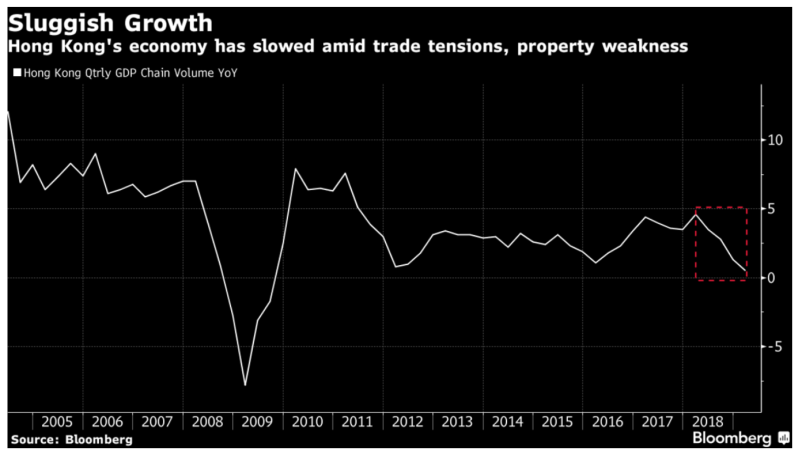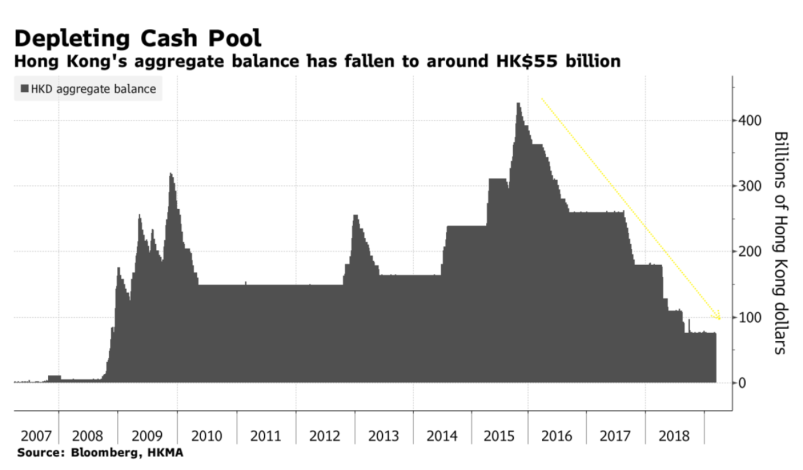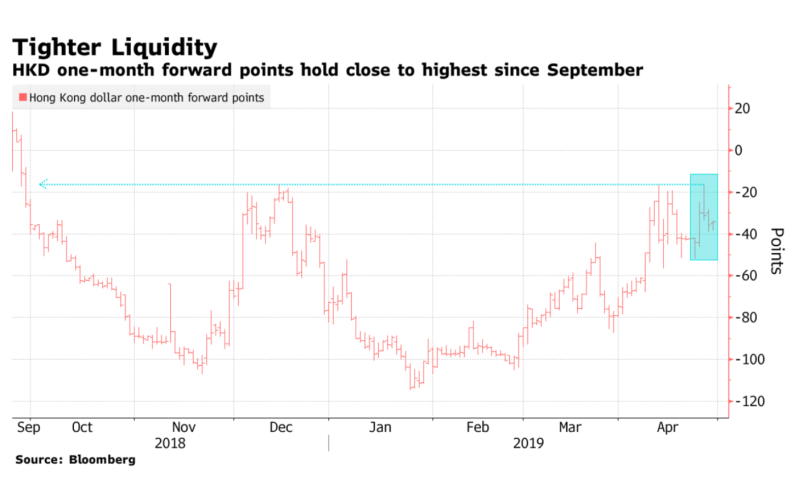In mid-March I wrote a piece highlighting the weakening Hong Kong economy and – specifically – the very fragile Hong Kong Dollar (HKD) semi-peg system. . .
In summary: I detailed why – according to the ‘Impossible Trinity’ theory – the HKD/USD peg can’t sustain much longer at its current rate. And that the market is seriously underestimating a potential ‘breaking-point’. So – where are things at now?
Well – on Thursday – news was published that Hong Kong’s economy grew at only 0.5% in the first quarter – its weakest pace since the 2008 financial crisis. (This follows a sluggish Q4/2018 of 1.2%).

And although falling property values, slowing Chinese demand, and higher-rates are weighing on the Hong Kong economy – the real issue I see is in the Hong Kong dollar.
Let me explain. . .
Just as I wrote back in March, the Hong Kong central bank – aka The Hong Kong Monetary Authority (HKMA) – has spent many billions of their cash reserves attempting to defend the HKD peg.
They do this because – since May 2005 – the HKMA officially pegged their currency to the U.S. dollar.
And since then – it trades within a range of 7.75 – 7.85 HKD for every one USD.
That means: if the HKD nears the bottom of the 7.75 range (meaning the HKD is stronger), the HKMA must sell HKD and buy USD (to decrease the HKD’s relative value). But if the HKD nears the top of the 7.85 range (meaning it’s weaker), the HKMA must instead sell USD and buy HKD (to increase the HKD’s relative value).
Thus – since the Federal Reserve has been tightening since late 2016, the U.S. dollar’s soared in value. And short-term borrowing costs have jumped.
This causes a natural flow from the HKD (a lower yielding currency) to the USD (a higher yielding currency).
Let me explain. . .
Since Hong Kong has a freely-convertible currency – depositors can convert their HKD’s and instantly receive USD instead (or vice versa).
Thus – because of the Fed’s tightening – the USD is now a higher yielding currency compared with the HKD.
For instance – the one-month overnight USD rate is currently at 2.37% (according to LIBOR – the London Interbank Offered Rate). But the one-month overnight HKD rate is only 1.41% (according to HIBOR – the Hong Kong Interbank Offered Rate.
That’s almost a 1% difference. . .
And because of this – traders and depositors are taking advantage of the arbitrage opportunity by shorting the HKD and going long the USD instead. This is known as a ‘carry trade’.
Putting it simply – traders borrow HKD cheaply at a lower HIBOR, sell those HKD on the market, buy USD in return, and collect almost 1% more in “risk free” interest.
Sounds like a sweet deal – right?
Well – the problem is – normally a currency (the HKD here) would significantly weaken because of all this selling.
But because the HKD is pegged – the HKMA must step in and use their own cash reserves to defend the currency. (To counter the trader/depositor HKD selling, they must step in and buy HKD with their own U.S. dollars).
And to show you an example of how costly this is – the HKMA spent HK$22.1 billion (that’s $2.8 billion USD) in March alone just to keep the peg from breaking.
In fact – over the last three years – the HKMA has spent roughly 80% of their cash reserves (aka “aggregate balance”) doing so. . .

(This is the lowest the aggregate balance has been at since November 2008).
Therefore – if this situation continues – the HKMA will bleed through their entire excess reserves.
And once depleted – rates (such as HIBOR) will soar in attempt to bring capital back in.
The downside of this is that sharply higher rates would most-likely ‘blow-up’ the entire Hong Kong banking system (and already weakening economy).
But most importantly – the peg will probably break.
No wonder Kyle Bass – the Managing Partner of Hayman Capital – recently said, “Hong Kong currently sits atop one of the largest financial time bombs in history”. . .
Of course – this isn’t something I expect will happen tomorrow. Or even this year.
That’s because while the HKMA has defended the peg-system, they’ve tightened liquidity (i.e. raise short term rates). This has narrowed the spread between LIBOR (USD) and HIBOR (HKD), thus making it more expensive to short the HKD.

But the important question we must ask here is. . .
Can the very leveraged Hong Kong economy, banking system, and property market handle higher rates? (For example – Hong Kong private sector leverage is the highest of any country in the world).
I believe it can’t.
Thus – in the end – it all comes back to the ‘Impossible Trinity’ (again, read my previous article if you haven’t yet to understand this clearly).
And as long as things continue on this path – something has to give.
Either further weakness in the Hong Kong economy, banking system, and property-market.
Or the HKD-USD peg. . .
Again – while I don’t believe the peg will break anytime soon. I do think it’s becoming much more likely than the market expects. Especially as the HKMA bleeds through precious cash reserves defending it. And the Hong Kong economy continues decelerating.
With lower cash reserves – it makes Hong Kong banks and the HKD more fragile to sudden shocks and ‘black swans’.
So – as long as there’s positive asymmetry (low/fixed risk – high reward) from investors selling cheap options for an HKD devaluation – I’ll open a position. . .
